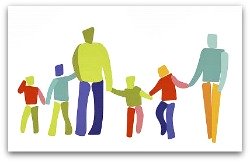Family History of Cancer
A family's history of cancer must be discussed during one of those family get-togethers you always have. It might be one of the most important family discussions you might ever have. It can save your life, your child's or another family member's life.
Is cancer hereditary? Unfortunately, the answer is yes. In fact, the most common and deadliest diseases facing people today tend to run in families. Diseases like heart illness, stroke, diabetes and cancer.

If someone in your immediate family - either your parent, brother, sister or child - has had cancer, you are at higher risk for the disease.
A positive history of cancer in your family is recognized as one of the most important risk factors in predicting your personal risk. The connection of first-degree family history to cancer risk has been consistently and positively determined for numerous cancers.
In fact, according to Heather Spencer Feigelson, PhD, MPH, an American Cancer Society epidemiologist specializing in genetics, a family history of cancer is considered to be an important risk factor for the following types:
- breast,
- colon,
- prostate, and
- ovarian.
When it occurs in one of your first-degree relatives, it increases your personal risk by 2 to 4 times higher compared to persons who have no family history of cancer. The rate of increase of risk depends upon the type of the disease as well. But your lifestyle also influences your vulnerability to tumor growth.
Furthermore, the number of affected relatives and having relatives with an early age of cancer onset further increase this risk. For example, if two or more first-degree relatives develop malignant tumors before they reach the age of 40 then your risk of getting them goes higher.
The magnitude of the risk is less when only second- or third-degree relatives are affected or when the cancer develops in a relative at the age of 65 and above. When cancer occurs at this age, then human aging is probably the major risk factor that triggers it to develop.
It's true you can never change your family history. You can't pick the family you will be born into. But being aware of your family's history of diseases helps a lot. Prevention is always a better choice and you actually do have a choice.
Remember that hereditary cancers are also triggered by other risks such as an increased level of some hormones in your body. For example, estrogen hormones increase in number when you are overweight or obese. Red meat is naturally high in saturated fats and if it's a constant part of your daily meals, you will have a weight problem. It becomes worse when it's meat from animals injected with growth-inducing hormones. The hormone residual can be transferred to you.
Since estrogen plays a major role in breast cancer, you should try not to gain beyond your normal body mass index (BMI) and you should be more careful with the food you eat. Opt for organically-produced food. If you have female relatives who have been diagnosed with the inflammatory type, refrain from drinking those margaritas and learn to practice stress relief tips.
If you and your doctor know that tumor development tends to run in your family, you can watch more closely for the early symptoms and signs of cancer.
Related Pages You Might Like:
Hereditary Cancers | Ionizing Radiation Causes Cancer | Dangers of Second Hand Smoking | Health Problems are Effects of Obesity | List of Acidic Foods that Causes Cancer
Cancer Prevention Home > Uncontrollable Causes > Is Cancer Hereditary
Images Copyright (c) 123RF Stock Photo



